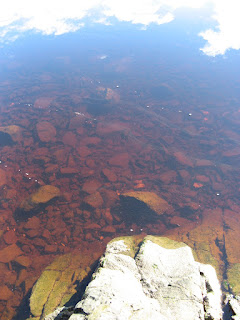Solvitur natando
Tomorrow will have an island. Before night
I always find it. Then on to the next island.
These places hidden in the day separate
and come forward if you beckon.
But you have to know they are there before they exist.
…
So to you, Friend, I confide my secret:
to be a discoverer you hold close whatever
you find, and after a while you decide
what it is. Then, secure in where you have been,
you turn to the open sea and let go.
William Stafford
In a paddock by the road, a brown falcon, shoulders hunched and wings outspread over a pademelon carcass, glares around at two ravens, who stand close enough to crowd and menace the hawk, but outside the range of its beak and talons. This is an old rivalry. It’s not that there’s any shortage of food just now – carrion eaters are doing well in the dry. Pademelons and eastern grey kangaroos and red-necked wallabies come to eat the green sprouts in roadside drains where water once ran, and the animals cross the roads and are hit by cars. Ravens are glossy and numerous; raptors raise chick after chick – though sometimes they get their talons caught in the mess of meat and can’t fly off, so they’re hit too. And quolls and devils get hit, feeding on roadkill at night.
High blue and gold days, still air – a quiet that feels like aftermath, something over, something gone. Flooding continues intermittently on the mainland, and cyclones still form in the Coral Sea and off the northwest coast of West Australia, but as the hemisphere tilts away from the sun this southern island rolls into the sunny bullseye of each high-pressure system that tracks eastward into the Tasman. Farmers and National Parks workers light fuel-reduction fires; forestry choppers drop incendiaries at the edges of logged-out coups to burn everything that’s left and reseed a monoculture in the ashes.
The winter gathering of black cockatoos continues. They come crying and calling and land all at once in the pine windbreak or in a stand of dead eucalypts and wattles – there are many patches of dying trees that came up in thin soil over rocky ground in wetter years and can’t survive these months of dry. As they begin to fail, woodboring insects flourish and now the cockatoos tear off bark to reach the borer grubs, sweet fat all through and thick as a thumb. Sated by this rich food the birds fly out in family groups to nearby trees within calling and visiting distance, and the adolescents play back and forth.
This life-longing to find language for what comes toward me from the world – to find a vocabulary that meets the encounter with human and nonhuman peoples and seasons and tides in all their textures, their complexities and tensions – speech that arises in response to the question what is this? Impossible speech for the not-yet-known, always coming into being along the edge of language, created for myself as part of ‘a people to come,’ achieving comprehension that is always partial, temporary, already confined, impeding the next necessary thing as it emerges. Always requiring me to turn to the open sea and let go.To find speech in this way is to question the givenness, the certainty of knowledge built on pairs of dark / bright opposites my culture constructs. And for me, movement-meditation is a key to developing this capacity to question what I think I know, as I move in and out of physical alignments in time and space that ask me to experience bodily comfort and discomfort, intensity and ease at once, feeling their entanglement. I learn to commit myself to the buoyancy and depth of this awareness.
The collapse of internally experienced dualities is transferrable to the mysterious pathways taken by my attention to what is around me, and to my attempts, as in this journal, to embody my conversation with the world. I learn to trust the sensations and accompanying words that emerge from places hidden in the day; I hold them close without rushing to judgement. Is the tension or ease expressed in my words true to what a body can hold? Is what I describe here adequate to creaturely experience? Language moves through me as rhythm, utterance, patterning where dualities confer with, rather than annihilating or neutralising each other. Not a stalemate or even a truce, but a proper wedding. It can happen.
Awake in the night I listen to an uilleann piper playing a spring song from the opposite side of the world, a story of lovers meeting among the freshness of flowers just now coming into blossom there. As if in answer, a murmur begins in the forest canopy downslope to the west of the house, a sound like a crowd, like the sea, and from out of it comes the smell of rain and then the first scatter of drops on the roof, unexpected, unpredicted in the long dry and failure of the autumn break. In the morning there’s not much in the rain gauge but everything is freshened and the first scarlet robin pairs chase through the garden. Even in a season like this, lovers of the inner-outer worlds can go on meeting.
References
Gilles Deleuze and Félix Guattari. What is Philosophy? Trans. Hugh Tomlinson and
Graham Burchell. Columbia UP, 1994. ‘a people to come’ p. 176.
William Stafford. ‘Security.’ Passwords: Poems. HarperCollins, 1991.






Comments
Post a Comment